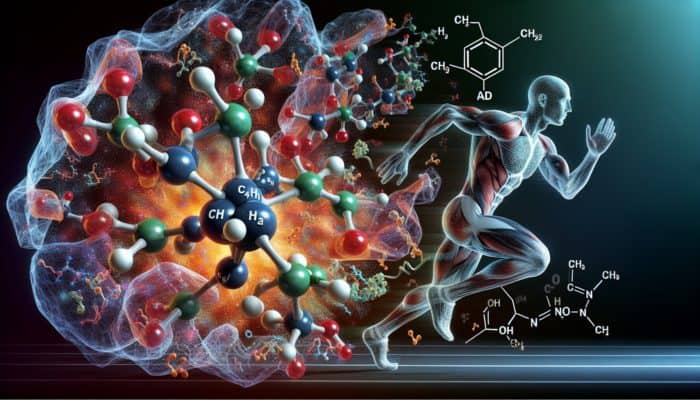Unlocking the Power of Creatine: Exploring Its Essential Functions and Incredible Benefits
Diving Deep into the Complex Chemical Structure of Creatine

Creatine in Everyday Fitness: Creatine is a naturally occurring compound that plays a crucial role in energy production within muscle cells. Synthesised primarily from amino acids, its chemical structure, represented by the formula C4H9N3O2, highlights its remarkable ability to efficiently store and release energy. A staggering 95% of creatine is stored in the skeletal muscles in the form of phosphocreatine, while the remaining 5% circulates in the bloodstream. During intense bouts of physical activity, particularly in high-intensity exercise, creatine swiftly donates its phosphate group to adenosine diphosphate (ADP), enabling the regeneration of adenosine triphosphate (ATP), which serves as the body’s primary energy currency. This exceptional ability to enhance ATP production is what elevates creatine to a status of an essential supplement for maximising athletic performance and endurance.
For fitness enthusiasts aiming to optimise their workouts, an in-depth understanding of creatine’s chemical structure is imperative. Beyond its critical role in energy availability, creatine also significantly enhances cellular hydration. By fostering increased water retention within muscle cells, it cultivates an ideal environment that promotes muscle growth and strength development. The intricate mechanisms behind creatine's functionality underscore its vital presence in everyday fitness, establishing it as a favoured supplement among athletes worldwide.
The Vital Contribution of Creatine to Energy Production
The importance of creatine in energy production is profound and warrants serious consideration. During short, intense physical activities, such as sprinting or weightlifting, muscles require immediate energy sources, and this is where creatine becomes indispensable. By facilitating the rapid regeneration of ATP, creatine empowers athletes to sustain elevated performance levels, enabling them to push through fatigue and significantly amplify their training intensity.
Numerous studies consistently reveal that creatine supplementation leads to significant improvements in both muscular strength and power output. For example, research involving resistance training indicates that individuals who supplement with creatine can perform additional repetitions and lift heavier weights compared to their non-supplementing counterparts. This results in greater muscle hypertrophy over time, particularly for those engaged in structured weight training programmes. Furthermore, the advantages of creatine extend across various athletic pursuits, from sprinting to high-intensity interval training (HIIT), showcasing its versatility and effectiveness.
Incorporating creatine into daily fitness routines can significantly differentiate between average and exceptional workouts. Whether navigating a challenging trail in the Swiss Alps or sprinting through the lively streets of Tokyo, creatine provides the additional edge needed to tackle these challenges with enhanced energy and determination.
Exploring the Variety of Creatine Supplements Available in the Market
A diverse selection of creatine supplements exists, each providing unique benefits tailored to varying fitness goals. The most prevalent form is creatine monohydrate, renowned for its effectiveness and economical nature. Extensive research validates its capability to enhance muscular strength and endurance when utilised consistently.
Other variations include creatine ethyl ester, which claims to improve absorption rates, and buffered creatine, formulated to alleviate gastrointestinal discomfort. Additionally, creatine citrate may attract those searching for a more soluble alternative. Each form possesses distinct characteristics catering to personal preferences and physiological tolerances.
When assessing creatine for everyday fitness, comprehending these various options empowers users to select the most suitable supplement for their specific requirements. For athletes training in diverse environments—from the humid jungles of Brazil to the arid deserts of the Middle East—choosing the right creatine product can profoundly enhance performance and training outcomes.
Revealing the Extensive Benefits of Creatine Supplementation

Supplementing with creatine provides a plethora of advantages that extend well beyond mere enhancements in physical performance. One of the most compelling benefits is its potential to stimulate muscle growth. By increasing the availability of phosphocreatine, athletes can engage in more intensive training sessions, yielding significant muscle hypertrophy.
Moreover, research has linked creatine supplementation to enhancements in cognitive function, particularly under stress. Studies suggest that creatine can improve mental clarity and alleviate fatigue during high-pressure situations, making it an appealing option for athletes competing at various levels.
Incorporating creatine into a balanced fitness regimen can also expedite recovery following workouts. As muscles repair and adapt, creatine plays a crucial role in restoring muscle glycogen, which is vital for maintaining performance in subsequent training sessions. Athletes engaged in demanding training—whether in bustling gyms or serene outdoor settings—can benefit from accelerated recovery.
The versatility of creatine in boosting overall athletic performance positions it as an invaluable companion for fitness enthusiasts worldwide. Whether preparing for a marathon, gearing up for a competition, or simply aiming to achieve personal fitness milestones, creatine serves as a powerful ally when employed effectively.
Harnessing the Benefits of Creatine for Fitness Enthusiasts
Maximising Muscle Growth and Strength with Creatine
The association between creatine supplementation and muscle growth is well-documented in fitness literature. When individuals begin incorporating creatine into their routines, they often notice an increase in muscle mass attributed to enhanced water retention within muscle cells, resulting in a “fuller” appearance. This physiological process stimulates protein synthesis, essential for muscle repair and growth.
Additionally, creatine allows athletes to perform more repetitions at higher intensities. For instance, during strength training, an individual utilising creatine may complete an additional set or lift heavier weights. This principle of progressive overload is fundamental for muscle adaptation and growth.
In practical terms, whether crossing a demanding trail in the Andes or participating in a CrossFit competition at a local gym, the strength gains and muscle growth linked to creatine can provide the competitive edge necessary to excel. The global fitness community—from competitive bodybuilders in the United States to recreational athletes in Australia—underscores the broad applicability of these benefits.
Enhancing Athletic Performance with Creatine

The impact of creatine on athletic performance enhancement extends far beyond muscle development; it significantly influences workout intensity and endurance. Athletes incorporating creatine into their training routines frequently report improved performance during high-intensity, short-duration activities. This advantage is particularly beneficial in sports that demand quick bursts of power, such as sprinting or weightlifting.
Research has confirmed that creatine supplementation can lead to substantial increases in peak power output and overall performance metrics. For athletes competing on an international stage—be it in track and field events across Europe or team sports in Asia—creatine can enhance their competitive edge.
Furthermore, the psychological aspect of performance should not be underestimated. Knowing that they are utilising a supplement that boosts energy levels can instil confidence in athletes, potentially leading to improved performance outcomes. This synergy between mental fortitude and the physiological benefits of creatine empowers athletes to achieve their peak performance levels.
Facilitating Recovery and Reducing Injury Risks with Creatine
One of the significant yet often overlooked advantages of creatine supplementation is its role in promoting recovery and minimising injuries. After strenuous workouts, muscle fibres endure micro-traumas that require effective repair. Creatine aids in this recovery process by promoting faster recovery times, allowing athletes to resume training with minimal downtime.
Moreover, certain studies suggest that creatine may help reduce the risk of injuries by enhancing muscle strength and resilience. For instance, athletes engaged in high-impact sports, such as football or basketball, can benefit from improved muscle integrity, which is crucial for preventing strains and tears.
For fitness enthusiasts exploring the globe, whether relaxing on beaches in Bali or skiing in the Alps, the assurance of quicker recovery and reduced injury risks can profoundly influence their training approach. This proactive strategy not only prolongs athletic careers but also enhances enjoyment in fitness activities.
Effortlessly Integrating Creatine into Your Fitness Routine
Determining the Optimal Dosage and Timing for Creatine Intake
Establishing the ideal dosage and timing for creatine supplementation is essential for maximising its benefits. The standard loading phase typically involves consuming 20 grams of creatine daily for approximately five to seven days, divided into four smaller doses. This approach saturates the muscles, ensuring optimal creatine levels for enhanced performance benefits.
Following the loading phase, a maintenance dose of about 3 to 5 grams per day is recommended. Timing is equally crucial for effectiveness; many athletes find that consuming creatine immediately post-workout is beneficial, as it aids in replenishing energy stores and facilitating recovery.
For individuals engaged in training routines that vary in intensity and duration—whether ascending high-altitude peaks in the Rockies or cycling along the stunning Mediterranean coast—grasping the timing and method of creatine consumption can yield significant benefits. This strategic approach allows athletes to harness the full potential of creatine throughout their daily fitness journeys.
Enhancing Results by Combining Creatine with Other Performance Supplements
Creatine can be effectively paired with other supplements to further enhance performance outcomes. For instance, combining creatine with protein can accelerate muscle recovery and growth, making it a popular choice among strength athletes.
Furthermore, integrating branched-chain amino acids (BCAAs) offers additional muscle protection during workouts. This combination is particularly beneficial for endurance athletes, who often engage in extended training sessions that may lead to muscle breakdown.
For those participating in a variety of fitness activities—from serene yoga retreats in Bali to high-intensity training in urban gyms—understanding how to effectively stack creatine with other supplements can amplify overall performance and recovery. By tailoring supplementation strategies according to individual training demands and objectives, athletes can optimise every moment invested in their fitness journeys.
Strategically Planning Workouts to Maximise Creatine Benefits
To fully leverage the advantages of creatine, thoughtful workout planning tailored to individual goals is critical. For strength-focused athletes, integrating heavy lifting sessions with fewer repetitions can exploit creatine's ability to enhance power output and improve muscle strength.
Conversely, endurance athletes may find value in incorporating high-intensity interval training (HIIT) into their routines. This method aligns seamlessly with creatine’s energy-boosting properties, allowing for sustained performance over longer durations.
Athletes charting their journeys through breathtaking locations—whether ascending majestic mountains in the Himalayas or cycling through picturesque vineyards in France—can utilise these workout strategies to enhance their performance. By synchronising their training with the unique benefits of creatine, they can improve their fitness outcomes and overall experience in their chosen sport.
Understanding Potential Side Effects and Ensuring Safe Use of Creatine
Identifying Common Side Effects Associated with Creatine Use
While creatine supplementation is generally considered safe for the majority of individuals, some may encounter mild side effects. Common issues include gastrointestinal discomfort, cramping, and dehydration. These side effects can often be minimised by maintaining proper hydration and taking creatine with meals to enhance absorption.
It’s important to note that many athletes using creatine report minimal to no adverse effects. However, individuals should be mindful of their body’s responses to supplementation, especially when starting a new regimen.
For fitness enthusiasts traversing diverse environments—from humid beaches in the Caribbean to arid deserts in Africa—prioritising hydration becomes essential. Understanding these potential side effects allows athletes to navigate their fitness journeys with confidence, ensuring that the benefits of creatine significantly outweigh any concerns.
Evaluating the Long-Term Safety Profile of Creatine
The long-term safety of creatine supplementation has been thoroughly researched, with findings indicating that it is safe for healthy individuals when used as directed. Studies have shown no significant adverse effects on kidney function or other health parameters in long-term users.
For athletes, particularly those engaged in rigorous training, creatine has proven to be not only safe but also beneficial for sustained performance. This positive safety record encourages many to incorporate creatine into their long-term training regimens without fear of negative consequences.
As athletes travel the globe—whether competing in vibrant cities across Europe or training in serene landscapes—they can rest assured that creatine is a reliable ally. This assurance fosters a deeper commitment to their fitness journeys, underscoring the importance of informed supplementation.
Identifying Groups That Should Approach Creatine with Caution
While creatine is deemed safe for most individuals, specific populations should approach supplementation with caution. Those with pre-existing kidney conditions or those on medications affecting kidney function should avoid creatine, as it may exacerbate underlying health issues.
Additionally, pregnant or breastfeeding women are typically advised to refrain from using creatine supplements due to insufficient research on long-term effects. These individuals should consult healthcare professionals before embarking on any supplementation regimen.
For those exploring fitness in various settings—whether in bustling urban gyms or tranquil rural areas—recognising who should avoid creatine ensures a responsible approach to health and wellness. Being well-informed empowers individuals to make choices that align with their unique health profiles while still pursuing their fitness aspirations.
Understanding Interactions Between Creatine and Medications
Creatine may interact with certain medications, particularly those that affect kidney function. For example, diuretics can heighten the risk of dehydration when taken alongside creatine, potentially leading to complications.
Individuals prescribed medications for chronic conditions should consult their healthcare providers prior to initiating creatine supplementation. This precautionary measure helps to avoid potential interactions while ensuring a safe and effective approach to fitness.
For fitness enthusiasts navigating their wellness journeys—whether competing in local races or training in exotic environments—being aware of these interactions can enhance their health strategies. Taking the time to understand how supplements like creatine fit into a broader health context reinforces a commitment to responsible fitness practices.
Tracking Progress and Adjusting Creatine Dosages
Monitoring individual responses to creatine supplementation is essential for optimising its benefits. Athletes should remain vigilant about how their bodies react, making necessary adjustments to dosages based on their performance and any side effects they may experience.
Regular evaluations can aid in determining the optimal dosage for each individual, ensuring they reap the benefits of creatine without encountering adverse effects. This ongoing assessment enables personalised adjustments to enhance fitness outcomes over time.
In diverse training environments—whether traversing rugged trails in Patagonia or participating in urban fitness classes—tailoring creatine use through careful monitoring fosters a deeper connection to one’s fitness journey. Adapting to personal needs and conditions signifies a commitment to maximising both performance and health.
Dispelling Myths and Misconceptions Surrounding Creatine
Clarifying the Connection Between Creatine and Water Retention
One of the most widespread myths surrounding creatine is its association with excessive water retention. While it is true that creatine increases water content in muscle cells, this does not equate to unwanted weight gain. Instead, it represents a natural physiological response that positively contributes to muscle fullness and growth.
Athletes can take comfort in knowing that this temporary increase in water weight often correlates with enhanced performance and muscle development. Understanding this distinction empowers fitness enthusiasts to make informed decisions regarding their supplementation strategies, especially when preparing for competitions or events globally.
In varied training environments—from the humid tropics of Southeast Asia to the arid landscapes of the Middle East—athletes can fully benefit from creatine without concerns about its negative impacts on body composition.
Debunking Myths About Creatine and Kidney Damage
Concerns regarding creatine’s potential to cause kidney damage have circulated widely but are largely unfounded. Extensive research has confirmed that creatine is safe for healthy individuals, exhibiting no significant adverse effects on kidney function.
Numerous studies indicate that creatine does not harm the kidneys in individuals without pre-existing conditions. This reassurance is vital for athletes who depend on creatine’s benefits for training and performance enhancement.
For fitness enthusiasts competing across diverse locations—from mountain trails to urban marathons—understanding the safety profile of creatine fosters confidence in their supplementation choices. This knowledge allows them to focus on performance and growth without unfounded fears of potential harm.
Differentiating Creatine from Anabolic Steroids
A common misconception is that creatine is a steroid. In reality, creatine is a naturally occurring compound synthesised from amino acids in the body, whereas anabolic steroids are synthetic derivatives of testosterone intended to promote muscle growth.
Unlike steroids, which can have considerable side effects and legal ramifications, creatine is widely acknowledged as a safe and effective supplement for enhancing performance. This distinction is critical for athletes aiming to improve their fitness without resorting to prohibited substances.
As athletes train in diverse arenas—from competitive sports in Europe to recreational fitness in South America—understanding the differences between creatine and steroids enables informed supplementation decisions that prioritise health and integrity.
Addressing Concerns Regarding Creatine and Hair Loss
Another prevalent myth suggests that creatine supplementation may contribute to hair loss. However, research has not substantiated this claim, indicating that any potential hair thinning is likely unrelated to creatine use.
Factors such as genetics and hormonal changes are the primary contributors to hair loss. Athletes can focus on the numerous benefits of creatine for muscle growth and performance without worrying about its impact on their hair health.
As fitness enthusiasts engage in training across various landscapes—from beach workouts in Australia to mountain trekking in Canada—understanding the myths surrounding creatine helps to cultivate a positive relationship with supplementation. Embracing its benefits while dismissing unfounded fears promotes a healthier fitness journey.
Understanding the Non-Dependency Nature of Creatine Supplementation
A widespread misconception is that creatine can lead to physical dependency. In truth, creatine is not a substance that induces dependency; it can be safely discontinued without adverse effects.
Individuals who stop using creatine may experience a gradual decline in muscle creatine levels, but this does not necessarily indicate any negative impact on overall health or performance. Athletes can choose to cycle creatine use as needed, allowing for flexibility in their training strategies.
For fitness enthusiasts exploring various training environments—whether competing in local competitions or pursuing personal fitness goals—the understanding that creatine does not foster dependency reinforces confidence in their supplementation practices. This knowledge fosters a more empowered approach to fitness and performance.
Maximising the Benefits of Creatine for Varied Fitness Objectives
Utilising Creatine in Strength Training Regimens
Creatine serves as an essential ally for individuals dedicated to strength training. By enhancing ATP production, creatine enables athletes to lift heavier weights and partake in more intense workouts. This increased capacity for effort is directly correlated with gains in muscle strength.
For instance, individuals participating in powerlifting or bodybuilding competitions can leverage the advantages of creatine to enhance their training sessions. The ability to perform additional repetitions or sets significantly contributes to muscle hypertrophy and overall strength enhancement.
As athletes pursue their strength training objectives in diverse environments—from bustling gyms in metropolitan areas to remote locations with limited equipment—creatine can enhance their performance and result in noticeable improvements in their outcomes.
Boosting Performance in Endurance Sports with Creatine
While creatine is often associated with strength training, its benefits also extend to endurance athletes. By enhancing energy availability during high-intensity bursts of activity, creatine can elevate performance in endurance sports such as running or cycling.
Incorporating creatine into an endurance athlete's regimen can improve sprinting capability, facilitating stronger finishes during races or training sessions. This adaptability is especially valuable for athletes competing in events that require both endurance and power.
Whether navigating a half-marathon through the stunning landscapes of New Zealand or cycling through the picturesque vineyards of France, endurance athletes can harness the potential of creatine to enhance their training and performance outcomes.
Promoting General Fitness and Well-Being with Creatine
Creatine's benefits extend beyond competitive athletes to individuals pursuing general fitness and health. The supplement supports muscle health, aids in recovery, and can enhance overall energy levels.
For those embarking on a fitness journey, incorporating creatine can facilitate consistent training and improved results, whether in local fitness classes or independent workouts at home. This versatility encourages greater adherence to fitness programmes, promoting long-term health and wellness.
As fitness enthusiasts engage in a variety of activities—whether hiking the Appalachian Trail or participating in yoga retreats worldwide—creatine acts as a supportive supplement that enhances their overall well-being.
Utilising Creatine for Effective Muscle Building
For individuals focused specifically on muscle building, creatine represents a cornerstone of supplementation. Its capacity to increase workout intensity and frequency results in greater gains in muscle mass.
By facilitating muscle recovery and minimising fatigue, creatine enables sustained training efforts, essential for those seeking significant muscle growth. This ability benefits a wide range of athletes, from competitive bodybuilders to casual gym-goers.
As fitness enthusiasts navigate their muscle-building journeys in diverse environments—whether at home or in global fitness centres—creatine can substantially contribute to their success and overall progress.
Supporting Weight Loss Goals with Creatine
Interestingly, creatine can also assist weight loss efforts, primarily by helping to preserve lean muscle mass during caloric deficits. When individuals aim to lose weight, maintaining muscle is crucial for keeping metabolism elevated.
By enhancing workout performance, creatine aids individuals in retaining strength and muscle while shedding fat, leading to a more toned physique. This aspect is particularly important for those engaged in body recomposition efforts.
As fitness enthusiasts navigate their weight loss journeys—from urban fitness classes to solo runs in picturesque locales—creatine can be a valuable ally in achieving their goals without sacrificing muscle integrity.
Common Questions About Creatine Addressed
What is the best timing for creatine consumption?
The optimal time to take creatine is immediately after a workout, as this can enhance recovery and restore energy stores. Some individuals also opt to take it prior to workouts for an immediate energy boost.
How much creatine should I consume daily?
A common recommendation is to initiate with a loading phase of 20 grams per day for the first week, followed by a maintenance dose of 3 to 5 grams daily.
Can creatine influence hydration levels?
Yes, creatine can cause increased water retention in muscle cells. It is vital to stay well-hydrated to minimise the risk of dehydration during workouts.
Is creatine safe for long-term use?
Yes, research indicates that creatine is safe for healthy individuals when used as directed. Long-term studies have shown no significant adverse effects.
Does creatine lead to weight gain?
Creatine may result in temporary weight gain due to increased water retention in muscles. This is generally viewed as a beneficial effect associated with muscle fullness and growth.
Can I combine creatine with other supplements?
Yes, creatine can be safely combined with other supplements, such as protein, BCAAs, or pre-workout formulas, to enhance performance and recovery.
Will creatine assist in endurance sports?
Creatine can enhance performance in endurance sports, especially during high-intensity efforts. It supports strength improvements, benefitting overall endurance.
Are there any side effects associated with creatine?
Common side effects include mild gastrointestinal discomfort and cramping. These can often be minimised through proper hydration and by taking creatine with meals.
How does creatine differ from anabolic steroids?
Creatine is a naturally occurring compound in the body, while steroids are synthetic substances that mimic testosterone. Creatine enhances muscle energy, whereas steroids promote muscle growth and hormonal changes.
Can vegetarians benefit from creatine supplementation?
Yes, vegetarians and vegans may experience more pronounced benefits from creatine supplementation, as their diets typically contain lower levels of creatine from natural sources.
Connect with us on Facebook!
The Article Creatine in Everyday Fitness: Unlock Your Potential appeared first on https://athleticsupplement.com
The Article Creatine for Everyday Fitness: Unlock Your Potential Was Found On https://limitsofstrategy.com

